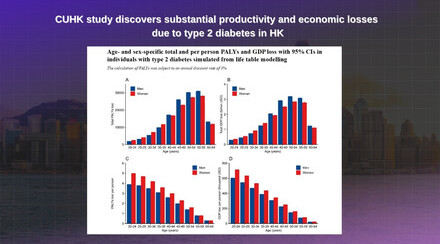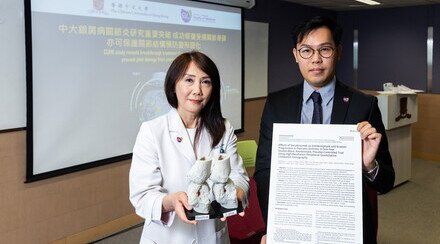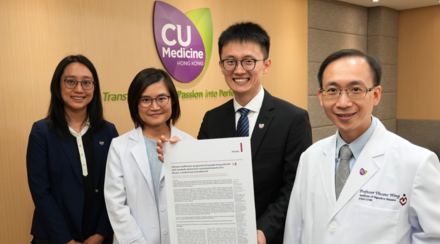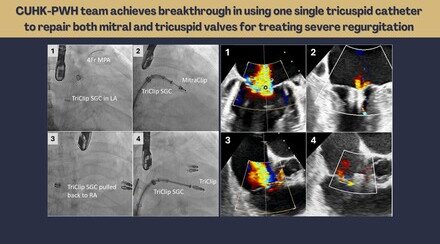CUHK Study Reveals Patients with Recovery of Hepatitis B Still at Risk of Liver Cancer
Study conducted by researchers from the Faculty of Medicine of The Chinese University of Hong Kong (CUHK) revealed that patients with hepatitis B recovery are still at risk of developing liver cancer. The research team discovered that male chronic hepatitis B patients who achieved recovery after the age of 50 have a higher risk of liver cancer. They are recommended to continue undergoing regular liver cancer surveillance. This study cohort is the world’s largest of its kind. Results have been published in the international medical journal The Journal of Hepatology.
Chronic hepatitis B remains most common cause of liver cancer in Hong Kong and the Asia-Pacific region
Chronic hepatitis B remains the most common cause of liver cancer in Hong Kong as well as in the Asia-Pacific region. According to the Hong Kong Cancer Registry of the Hospital Authority, there were around 1,800 new cases of liver cancer in 2015, while the number of deaths was almost 1,600. Liver cancer was the third commonest cancer death in men and fourth commonest cancer death in women in that year.
In clinical practice, it has been found that some chronic hepatitis B patients have seroclearance of hepatitis B surface antigen (HBsAg), which means recovery of hepatitis B.
Prof. Henry Lik Yuen CHAN, Director of Center for Liver Health, Faculty of Medicine at CUHK, stated, ‘Though HBsAg seroclearance is regarded as the functional cure of chronic hepatitis B, we still encounter liver cancer in patients who have achieved this favourable endpoint. The risk factors of liver cancer in patients who have recovery of hepatitis B are poorly understood. Physicians and patients may neglect the importance of liver cancer surveillance after HBsAg seroclearance.’
Hepatitis B recovery happens in Chinese patients
Researchers from the Faculty of Medicine at CUHK collected data from over 150,000 subjects who were HBsAg positive from 2000 to 2016 and conducted a large-scale analysis. Firstly, researchers studied serial HBsAg results from approximately 70,000 subjects who were once HBsAg-positive. Findings showed that recovery of hepatitis B happens in Chinese chronic hepatitis B patients, with cumulative probabilities increasing with age.
Results are listed as follows:
| Follow-up duration | Probabilities of hepatitis B recovery |
| 1 year | 0.5% |
| 3 years | 2.4% |
| 5 years | 5.1% |
| Patient Age | Probabilities of hepatitis B recovery |
| 40 years old | 1% |
| 50 years old | 2.5% |
| 60 years old | 6.9% |
Male chronic hepatitis B patients achieving recovery after 50 have higher risk of liver cancer; surveillance recommended
CUHK Medicine researchers also examined the risk factors of liver cancer in more than 4,500 patients who had achieved hepatitis B recovery. This study cohort is the largest of its kind worldwide. Results showed that the liver cancer risk of the entire cohort at 5 years after recovery was 1.5%. Gender and being over 50 years old were found to be two important risk factors of liver cancer and the results are tabulated as follows:
| Liver cancer risk at 5 years after hepatitis B recovery | ||
| > 50 years old | ≤ 50 years old | |
| Male | 2.5% | 0.7% |
| Female | 1% | 0 |
Prof. Grace Lai Hung WONG, Professor, Division of Gastroenterology and Hepatology, Department of Medicine and Therapeutics, Faculty of Medicine at CUHK, concluded, ‘Risk of liver cancer is still not negligible in male chronic hepatitis B patients who achieve recovery after the age of 50. We recommend regular liver cancer surveillance for these patients, as it is still cost-effective according to the latest international guidelines.’
In addition, the Hepatocellular Carcinoma Score Online Calculator launched by the Center for Liver Health at the Faculty of Medicine, CUHK allows individuals with chronic hepatitis B to calculate the risk of liver cancer according to their risk factors such as age and gender. For more information, please visit: https://livercenter.com.hk/calculator/.

Researchers from the Faculty of Medicine of The Chinese University of Hong Kong (CUHK) find that patients with seroclearance of hepatitis B surface antigen (HBsAg), which means recovery of hepatitis B, are still at risk of developing liver cancer. Study results show that male patients who achieved recovery after the age of 50 have a higher risk. Featured are (right) Professor Henry CHAN, Director of the Center for Liver Health, Faculty of Medicine at CUHK, and Professor Grace WONG, Division of Gastroenterology and Hepatology, Department of Medicine and Therapeutics, Faculty of Medicine at CUHK.

Professor Henry CHAN (right) remarks that gender and age are two important risk factors of liver cancer among cases with hepatitis B recovery. He reminds high risk group should not neglect the importance of liver cancer surveillance.


































































































